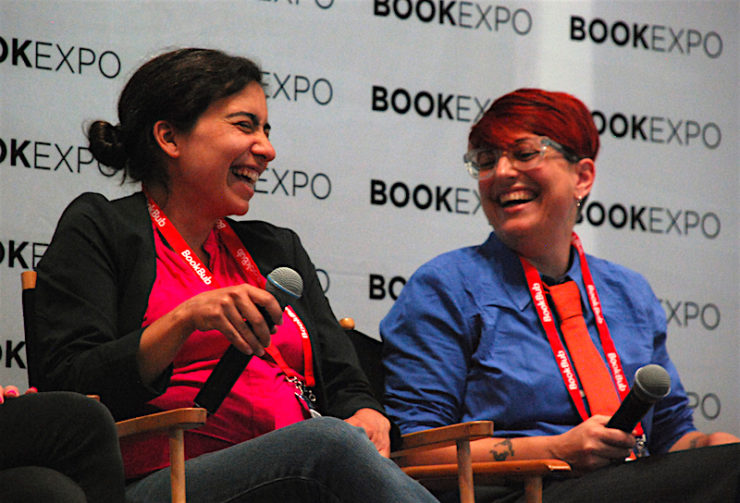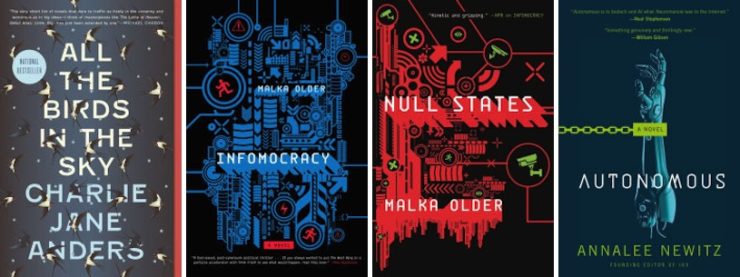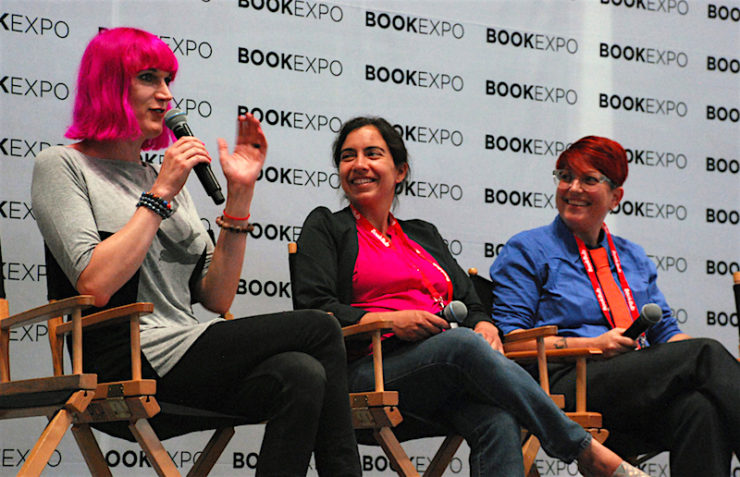Charlie Jane Anders, author of the Nebula Award-winning All the Birds in the Sky, moderated a lively BEA panel, “Women in Science Fiction” featuring Infomocracy author Malka Older and Autonomous author Annalee Newitz. The trio talked about imagining the future, balancing worldbuilding with strong characters, and the experience of first novelist.
Read on!
Anders opened by saying that Infomocracy and Autonomous share an interest in future history. How do the two writers create a realistic future, when the present is so tumultuous?
Malka Older: It depends on how far in the future you want to go. Infomocracy is set about sixty years in the future. I wanted to comment on “now” with enough distance to comment on where we’re heading. Now that I’m working on the third book in the series, it’s gotten harder to keep updating a future because the present is changing so rapidly.
Annalee Newitz: My novel is set 150 years in the future, so things that are happening now will be transformed. My future is recognizable—there are no half-human/half-lizard hybrids in the book…unfortunately. I tried to look at it in terms of generations. How many generations would there be between me and 150 years from now? I looked back at history and asked, “how different was my great grandmother’s life from my life now?” Some things are going to be the same—my grandmother would have been reading The Atlantic and Harpers, for instance. Some things will still be around from now will still be around. The main thing that is different in my future is that we have robots and AI who have gone through a civil rights movement and have fought for equality. And if I look back at my great-grandmother, well, now I can vote! We have, at least, nominal rights for people of color. Those are the things that have changed.
CJA: Both of your books have super fascinating worlds, but you also managed to populate them with memorable characters. How did you find the characters that worked for the worlds you created?
MO: When you have a conceptual book…I was thinking about how politics and government could look different in the future. But I didn’t want to write something just for policy wonks—I wanted an adventure! So I had to think about how to put the conceptual framework into the perspective of a good story. I wanted characters who could connect with readers in the present.
AN: …it’s hard. For me when I was beginning Autonomous it wasn’t that I wanted to build the world, or even the system of future slavery (called “ indenture” in the book)—my first image was of a robot feeling physical pain. Getting sand caught in his actuators in his legs. He’s a young robot, he’s on his first mission, and he’s struggling to understand his place in the world.The human around him keep projecting things onto him. But he feels pain—physical and then emotional pain, because suddenly the humans who have built him and raised him are putting him through this mission, and he feels betrayed. So I asked myself, “What does it mean for a robot to feel pain?” And then I built a world around him. Then I wrote Jack, who’s a human pirate, and she’ motivated by pain as well. The trick was balancing my nerdy excitement of worldbuilding with human sadness and horror.
CJA: An underlying theme in both books seems to be idealism and the subsequent burnout of idealism. Could you speak to that?
MO: I looked at it as a thought experiment. How could things be different? Better? I wanted the characters to be really engaged with their world, and the political process, and to be hopeful. Either that they wanted the system to work, or that they wanted to crash the system so that something better would be built in its place. I see [Infomocracy] as a very hopeful book. There are always going to be problems when you attempt to build a utopia. And in any election, there’s a sense of rush and intensity and exhaustion. We’ve seen depictions of exhaustion that comes with election, and the feeling of the limits of what could be accomplished even by these people who are so engaged.
AN: One of my characters starts as an idealistic grad student. She realizes that if she goes into biotech and medicine, well, it’s been completely corrupted by corporations. So she becomes an outlaw, and begins reverse-engineering drugs to give away and sell illegally. A lot of her friends don’t think of her as a scientist anymore, she has to flee from the law… and then she screws up. She makes a big mistake, and people die. The entire reason she began working illegally was to save lives, and now she has to figure out whether she was wrong in going outside the law. I think that’s what a lot of us face to some degree—we want to fight for a future, but how radical do we want to get?

CJA: I really love the sense of place you create in each book. In Infomocracy, well, now I feel like I know exactly where to go in Southeast Asia for great food (“There is a lot of great food,” Newitz agreed) and Autocracy delves so deeply into Saskatchewan and Morocco. How did you bring these places to life?
MO: You go there! If possible you live there for a while. In Infomocracy the government spans entire globe, so it was important that I show what it looked like to have a global system. You’re always told to write what you know, but I also think you can write what you miss—when you really want to eat a particular food and you can’t get it anywhere, that detail is going to come through! I thought it was important that I anchor the action in each place, rather than just giving a dateline in the heading of each chapter.
AN: I agree, I think you have to go to the places. My novel is set in northern Canada, in Saskatchewan—I recommend it! It’s also set in North Africa, and the Arctic, Since this is set 150 years in the future, if you’re a super-cool pirate with a badass ship, you’re going to be hanging out in the Arctic Sea. I have not actually sailed that sea yet, so I looked at maps to see how trade routes would be constructed, based on climate change and the slavery of my book’s future. And I agree, Malka has a great way of showing food, and also showing how it feels when you cross over a border. The environment doesn’t change, but the culture does, and it’s that kind of stuff, that detail, that makes the book. Some of my book is set in Casablanca, and I talk about the giant shiny mall that’s across from a mega mosque–in 150 years, those things will still be there, they’ll just be older, and less shiny.
CJA: When you’re writing the future, how important is it to think about climate change?
MO: It’s important and unavoidable. In my book, there are certain countries that are completely underwater, The Maldives, for instance. But I actually had to downplay climate change a little bit for the novel to work. I was looking a little bit optimistically.
AN: I think it’s crucial. Any vision of the future has to be informed by climate change. In my other life I’m a science journalist, and I’ve interviewed geologists and environment scientists. You ask them these questions and they give you a thousand yard stare and say: “Things are gonna be screwed up for the next thousand years.” Which, to a geologist’s way of thinking, is like no time at all.
CJA: I found it interesting that like books like The Craft Sequence, The Traitor Baru Cormorant, The Dandelion Dynasty, both of your books deal with politics and law.
MO: I write about stuff I find fascinating, so I’m glad other people think it’s fascinating too! Most of the ideas come from the experience of living in a lot of different countries–I have a decade of practical comparative politics. I was getting to build not just one future, but to look at future in Tokyo as opposed to Jakarta as opposed to New York City.
AN: I think Malka’s political system is amazing. I was more interested in system of property. I’ve worked with lawyers on intellectual property so I’ve thought a lot about that, and I wanted to think about how it works when intellectual property issues start to kill people. Pharmaceutical companies can jack up prices and kill people. Then I also have a system of slavery where robots can be owned. I wanted to ask, “What does it mean to have private property?” “When does private property become deadly?” I want to get people to rethink what they mean when they say “I own this.”
CJA: Both books have amazingly diverse futures–was this a thing that just naturally happened?
MO: It’s not a big change from the present! We live in an amazingly diverse place, and it was helpful going worldwide. The interesting part was more thinking about how people will define things in the future–what are the categories and lines that will be drawn, and are, or are not, contested? What new divisions have come up? As a species we tend to find ways to dice and slice ourselves into different groups.
AN: I’m just not that interested in white people. There are lots of great books about white people! But I don’t feel a need to write another book about white people. …or even humans. I’m more interested in non-human animals. And writing about robots and AI—humans are really weird, we have lots of strange rituals that are hard to understand. So it was easy to get away from standard white guy plot.
Finally, Anders closed by asking if Older or Newitz had any advice for writers in the crowd who might want to tackle future worlds in their own work. The two put perfect buttons on the panel, with Older saying that writers who want to imagine the future “need to pay attention to the now” and Newitz reminding everyone to “look to history” if they want to understand where humanity is going.
Charlie Jane Anders’ All the Birds in the Sky (Tor Books) and Malka Older’s Infomocracy (Tor.com Publishing) are both available now. Null States, the second book in Older’s Centenal Cycle, publishes September 19th. Annalee Newitz’ Autonomous (Tor Books) is also forthcoming September 19th.











